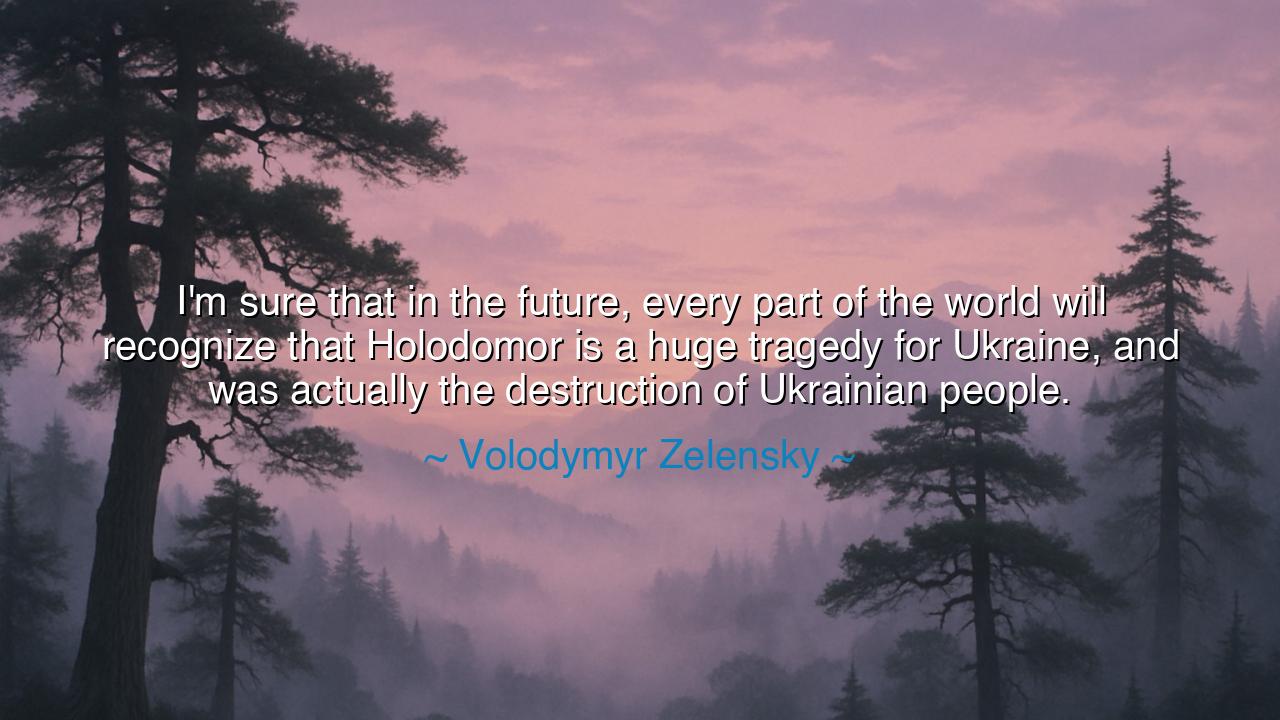
I'm sure that in the future, every part of the world will
I'm sure that in the future, every part of the world will recognize that Holodomor is a huge tragedy for Ukraine, and was actually the destruction of Ukrainian people.






"I'm sure that in the future, every part of the world will recognize that Holodomor is a huge tragedy for Ukraine, and was actually the destruction of Ukrainian people." These words by Volodymyr Zelensky serve as a powerful reminder of the immense suffering endured by the Ukrainian people during one of the most horrific chapters of their history: the Holodomor. Zelensky’s assertion speaks not only to the historical significance of the famine that took millions of lives in the early 1930s but also to the resilience of a nation that continues to fight for recognition of this tragedy and the preservation of its identity. The Holodomor, engineered by the Soviet regime, was not merely a famine—it was an act of systematic destruction, a deliberate starvation that sought to crush the very spirit of the Ukrainian people. Zelensky’s vision is that this tragedy will eventually be acknowledged globally, affirming the profound injustice done to the Ukrainian nation.
The ancient world knew well the power of memory and the importance of recognizing and commemorating the suffering of the oppressed. The Greeks and Romans, through their epic poems and historical writings, ensured that the legacies of their greatest tragedies and triumphs would never be forgotten. One need only look to Homer's Iliad, which, though celebrating the heroics of Achilles and others, also depicted the immense suffering caused by the Trojan War, reminding future generations of the cost of conflict. Similarly, Zelensky’s words remind us of the importance of remembering Holodomor—not as a mere historical event, but as a symbol of the suffering endured by a people, the price paid for independence, and the resilience that ultimately defined them. Just as the Greeks honored their dead through song and story, so too must we honor those who suffered during the Holodomor by ensuring their story is never forgotten.
Consider the tragedy of the Holocaust, another historical atrocity that, like the Holodomor, sought to erase a people from existence. The Jewish people suffered unimaginable loss, yet Holocaust survivors and leaders like Elie Wiesel made it their life’s mission to ensure that the atrocities of the Nazi regime would not be forgotten. Their advocacy for memory and recognition was not just for the sake of the past, but to prevent such horrors from ever repeating. Wiesel famously said, "To forget the dead would be akin to killing them a second time." This lesson underscores the importance of remembrance—without it, the suffering of the past remains unresolved, and the dignity of those who endured is lost. Zelensky’s call for global recognition of Holodomor echoes this sentiment, seeking not only justice for Ukraine but a world where such atrocities are acknowledged and never repeated.
The story of Mahatma Gandhi offers another poignant example of resilience in the face of immense suffering. Gandhi, who led India to independence through nonviolent resistance, knew the power of remembering and honoring past injustices while using them as a foundation for future peace. Just as Gandhi understood the significance of past sufferings in shaping the future of India, Zelensky understands that Holodomor is not just a relic of Ukraine’s past but a cornerstone for its future. By ensuring the world recognizes the Holodomor as a tragic event, Zelensky calls for a global acknowledgment that strengthens the Ukrainian identity, just as Gandhi’s efforts strengthened India’s identity in the global landscape.
The Holodomor serves as a painful reminder of the cost of oppression—a stark warning against the dehumanization of peoples and cultures. Yet, it also exemplifies the strength of a people who, despite having endured the most unimaginable loss, resisted and survived. Ukraine, like many nations scarred by history’s dark chapters, has emerged not as a weakened nation but as one with an indomitable spirit, proud of its heritage and resilient in the face of adversity. In this sense, Zelensky’s call is not just about recognition of tragedy but about the celebration of Ukraine’s survival, its defiance, and its unwavering commitment to independence. Just as the ancient Greeks celebrated their victories over adversity through the stories of their heroes, Zelensky seeks to honor the heroism of the Ukrainian people.
The lesson from Zelensky’s words is clear: to acknowledge and remember suffering is not an act of dwelling in the past but one of empowerment for the future. Just as the ancients taught that memory is essential for shaping a just society, we too must remember the suffering of those who came before us. Recognition of historical tragedies like the Holodomor is not just an act of justice for those who suffered, but an act of dignity for the generations that follow. In remembering these atrocities, we ensure that the values of human dignity and freedom continue to shape our future.
In our own lives, we must strive to honor the past, not by being consumed by it, but by using its lessons to guide our actions in the present. The story of Holodomor reminds us of the need for justice, the importance of standing together in times of crisis, and the necessity of global cooperation. As we move forward, let us work towards a world where the suffering of one people is recognized as the responsibility of all, and where memory and truth are preserved for future generations. In this way, we not only honor the past but create a future where such tragedies never occur again.






AAdministratorAdministrator
Welcome, honored guests. Please leave a comment, we will respond soon